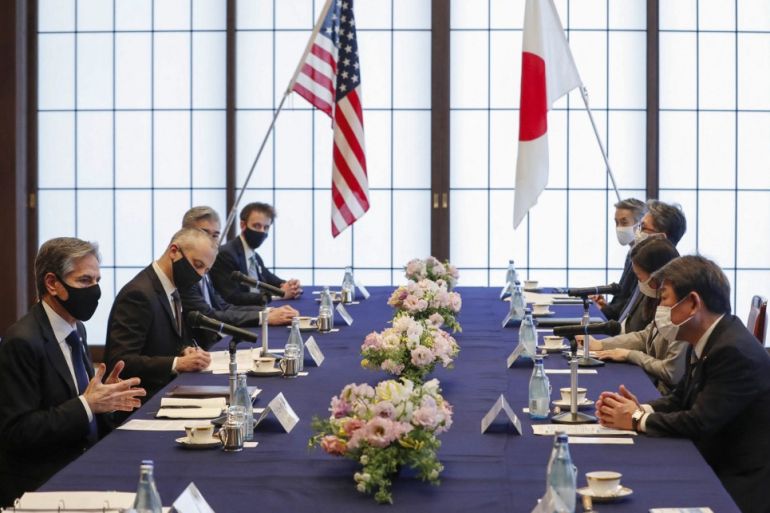US, Japan decry China’s ‘coercion and destabilising behaviour’
US secretaries of state and defense met with their Japanese counterparts in first foreign trip since taking office.

US and Japanese foreign and defence ministers have warned against “coercion and destabilising behaviour” by China and called for “complete denuclearisation” in North Korea during top level talks in Tokyo.
The statements on Tuesday came during Pentagon chief Lloyd Austin and Secretary of State Antony Blinken first foreign visit during the US administration of President Joe Biden. The officials will also visit South Korea as they look to strengthen regional alliances in the face of rising Chinese influence.
Keep reading
list of 4 itemsChina, North Korea top agenda as Blinken begins first Asian tour
‘Quad’ leaders pledge new cooperation on China, COVID-19, climate
Blinken says China presents top challenge to US foreign policy
The US officials, Japanese Foreign minister Toshimitsu Motegi and Defense Minister Nobuo Kishi warned that “China’s behaviour, where inconsistent with the existing international order, presents political, economic, military and technological challenges”.
“The ministers committed to opposing coercion and destabilising behaviour towards others in the region,” they added.
The ministers also shared “serious concerns” over “disruptive developments” such as the law China passed in January allowing its coast guard to fire on foreign vessels.
Motegi said China-related issues took up the majority of his bilateral talks with Blinken and “expressed strong opposition to China’s unilateral attempt to change the status quo in the East and South China Seas”.
Blinken said the US “will push back if necessary when China uses coercion and aggression to get its way”.
The ministers also reiterated their calls for North Korea’s “complete denuclearisation”, warning that Pyongyang’s arsenal “poses a threat to international peace and stability”.
Austin and Blinken are consulting with regional allies as part of a review of Washington’s policy towards North Korea. The White House said Pyongyang had so far rebuffed efforts from the US to engage in dialogue.
COVID-19, Human Rights discussed
Other issues discussed on Tuesday included COVID-19 vaccines, semiconductor supply-chain security, the military coup in Myanmar and human rights in North Korea, as well as in Hong Kong and Xinjiang.
Blinken said Tokyo and Washington shared a commitment to democracy, human rights and rule of law and said they were “under threat in many places, including in the region, whether it’s in Burma or whether in different ways, China”.
Earlier on Tuesday, Blinken also told a group of business leaders that the economic relationship between Washington DC and Tokyo is “one of the strongest in the world”.
Meanwhile, Motegi said Blinken expressed support for the staging of Tokyo Olympics during their bilateral meeting.
But Blinken sounded non-committal in his remarks to Tokyo-based US diplomats, saying the summer Games “involve planning for several different scenarios,” and adding that “whenever and however, Team USA ends up competing, it will be because of you”.
Quad alliance
Blinken and Austin’s visit to Tokyo and Seoul follows a virtual summit last week of the leaders of the US, Japan, Australia and India – the so-called Quad alliance. It was the first time leaders of the informal partnership, which many view as a regional bulwark against Beijing, had met.
The Quad summit pledged to work to ensure a free and open Indo-Pacific, a chief priority for Tokyo and to cooperate on maritime, cybersecurity and economic safeguards in the face of challenges from Beijing.
Diplomacy is back at the center of U.S. foreign policy. Today, I’m en route to Tokyo and Seoul to discuss how the United States will strengthen our cooperation in the #IndoPacific and across the globe with two of our closest allies. pic.twitter.com/m9s0VBeNiD
— Secretary Antony Blinken (@SecBlinken) March 14, 2021
During their visit, Blinken and Austin are also scheduled to make a courtesy call on Japanese Prime Minister Yoshihide Suga, who is set to visit the White House as the first foreign leader to meet Biden in April.
According to Japan’s NHK broadcaster, China is expected to be high on the agenda at that meeting, too.
Both US officials are set to leave Tokyo for Seoul on Wednesday and hold talks with their counterparts in the South Korean capital until Thursday.
They will then head back to the US where they will meet top Chinese diplomats, Yang Jiechi and Wang Yi in Anchorage, Alaska.